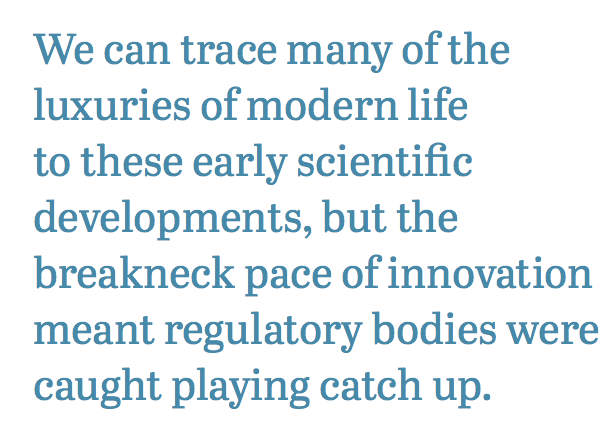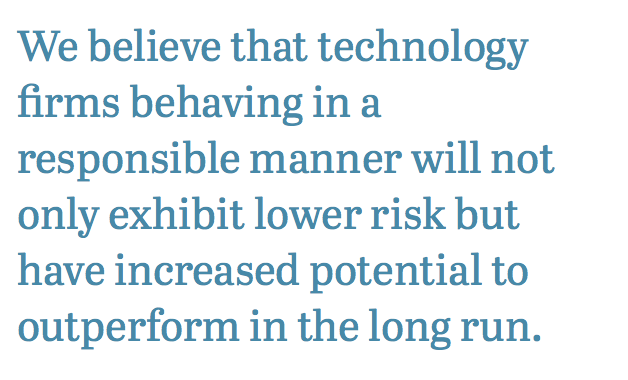Dave Harrison Smith, CFA, Executive Vice President, Domestic Equities and lead Portfolio Manager of Bailard’s technology strategies, explores the subtleties and depth required to uncover tech companies that are both high quality and responsible.
March 31, 2022
Build fast and break things is a common mantra among technology leaders. It speaks to the rapid pace of innovation and the fearless embrace of failure as a mere step in the overall process. Like the laws of physics, change is one of the few constants in tech. The last decade has illustrated how quickly the sector can evolve, as well as how massive the implications can be for our society. The scope and scale of today’s technology companies means that policies created, as well as actions taken, can have enormous global repercussions. Whether these implications are for the betterment of society is a rather complicated topic, making the unwritten contract between society and technology more crucial than it’s ever been.
Investors often believe there is a trade-off between companies that “do good” and stocks that outperform. We couldn’t disagree more. In our investment approach, we look for high-quality companies with responsible management teams and a history of strong execution. Within tech specifically, we believe that firms that “do good” have a structural advantage that extends to business results: an ability to build better brands, attract a superior workforce, and less frequently encounter regulatory scrutiny. We maintain that building a responsible investment portfolio in technology can lead to better long-term investment returns via reduced risk and better operating results.
Yet the rapid pace of innovation that we love about the tech sector means responsible investing can be incredibly nuanced and complex. Perhaps the formative example of this occurred in the early days of the semiconductor boom that transformed California’s Silicon Valley. Firms that are household names today and technology that is pervasive in our lives was rapidly emerging, and in many cases moving too quickly for regulatory bodies to keep up. In 1981, leaks in underground storage tanks were discovered at IBM and Fairchild Semiconductor, which resulted in significant and dangerous water contamination in San Jose and neighboring areas. While the link has never been proven, there have been allegations of a causal connection between these leaks and higher levels of birth defects in San Jose at that time. The discovery prompted not only massive lawsuits, clean-up efforts, and environmental stewardship improvements by the subject firms, but also the development of local and federal regulations to require tech firms to store toxic chemicals in double-walled containers and monitor for leaks.1 We can trace many of the luxuries of modern life to these early scientific developments, but the breakneck pace of innovation meant regulatory bodies were caught playing catch up.

The complexities of rapidly-developing industries mean that one cannot be dogmatic in approach as an investor. Determining whether a company is “doing good” is not straightforward. Let’s take the rideshare industry as a modern-day example of this multifaceted issue. Rideshare has exploded into our economy on the back of the ubiquitous availability of mobile phone connectivity and, with that explosive growth, regulators and labor groups have struggled to respond with new guidelines. Often the business model of rideshare companies (the “gig economy” as it is known) generates intense scrutiny from regulators and media, with proponents praising the flexibility it offers and detractors claiming worker exploitation. Yet, studies have shown that the positive societal impact of rideshare is enormous. A recent study from the University of California, Berkeley estimated that the introduction of Uber in major cities reduced traffic fatalities by 4.0% overall and reduced alcohol related fatalities by a remarkable 6.1%.2
How do you reconcile an evolving regulatory environment in a nascent disruptive industry with the long-term potential benefits to society? We believe that the combination of deep sector and ESG expertise can provide crucial industry intelligence and help define what a leader looks like in this space, while helping clearly identify which companies are improving their trajectory and working to define good behavior. The rideshare industry has the potential to provide great benefits to society and shareholders, while also creating a fair and safe working environment for its drivers and passengers. These outcomes are not mutually exclusive. In fact, achieving them all will be the key to long-term growth and profitability. Investors and managers cannot rigidly apply backward-looking metrics to the industry, but instead must ‘look under the hood’ to understand company and industry nuances and trajectory.
This is no easy feat. At Bailard, we combine our deep technology sector expertise and robust history of ESG management to go above and beyond basic screens and scores. We stand confident that our approach is differentiated in three important ways:
- Non-Standard Data (ESG Capture®). The ESG field has come a long way toward standardization over the last decade. Vendors like MSCI and Sustainalytics provide broad and deep datasets. Yet, as we discussed above, traditional ESG data can be lacking, particularly in small or newly public companies or in industries undergoing rapid transformation. This underscores the importance of augmenting analysis with non-standard datasets. We have identified several areas within our ESG Capture® process that work well in the technology sector, particularly around workplace sentiment, corporate governance, and real-time controversy monitoring. We believe these alternative indicators of responsible management are highly relevant to the tech sector and provide important complementary perspectives on individual companies. Bailard’s work here is always ongoing and we continue to find new ways to innovate and improve our process.
- Transitional Assessments. Subtleties are often not captured in standardized ESG screens. We have noted particular issues with evolving industries and relatively new companies. Our practice is to utilize transitional assessments of technology firms, where we attempt to identify and understand relevant societal, environmental, and governance issues in rapidly changing or nascent industries. For newly-public companies in particular, we have found transitional assessments to be critical, as traditional ESG vendors can have significant gaps in data due to lack of standardized reporting.
- Engagement. We believe investors can influence companies to behave more responsibly, and we are active members of several investor groups including As You Sow, the Ceres Investor Network, the Interfaith Center on Corporate Responsibility, and CDP (formerly known as the Carbon Disclosure Project). In addition to traditional ESG engagement opportunities, Bailard has begun a program to work with public companies where we observe discrepancies between the company’s sustainability track record and the stock’s vended ESG scores from major providers. Our teams conduct a gap analysis on vendor score discrepancies and discuss our findings with both the vendor and leaders at the target company. We believe this shareholder activism has the potential to positively influence the company’s stock price as ESG data is made current, the vended scores rise, and the shareholder base broadens.

“Build fast and break things” can be a powerful guiding principal that results in rapid code and product development. As we’ve seen, the global influence and power of the technology sector has never been greater, and actions taken by technology firms can reverberate with global ramifications. We believe that technology firms behaving in a responsible manner will not only exhibit lower risk but have increased potential to outperform in the long run. We also believe that investors can express their values and preference for responsibly-run companies through their investment portfolios while achieving competitive returns.
Given the nuance and rapid evolution of industries within technology, a thorough and thoughtful approach is necessary with collaboration between companies, investors, activists, and stakeholders. We are excited to continue our efforts on measuring, evaluating, and engaging with companies to encourage long term, responsible corporate strategies that encompass and benefit all stakeholders. Done right, investors can express their values via their portfolios, engage to influence companies in a positive direction, and achieve competitive returns in a responsible, principled way.
1 https://www.sfgate.com/bayarea/article/The-valley-s-toxic-history-IBM-trial-is-latest-2826844.php
2 https://bailard.com/wp-content/uploads/attachments/w29071.pdf
Recent Insights
Bailard CEO Ft. in Forbes, “Three Ways To Put Your Values And Your Team First In A Competitive Market”
Bailard's CEO Sonya Mughal, CFA offered three insightful ways leaders in the industry can fortify their culture and step up their communication practices to attract and retain high-performing teams.
May 2, 2024
Country Indices Flash Report – April 2024
The Japanese yen hit its lowest level versus the dollar since the 1980s late in the month, followed by a sharp bounce in the currency, which most suspect was driven by official intervention.
April 30, 2024
Quarterly International Equity Strategy Q1 2024
The global economic environment changed dramatically in the first quarter as bond yields, which had marched down in the 4th quarter on the belief that central bank pivots were fast approaching, reversed course. Prospects for mid-year reductions in short-term interest rates remain high for Europe and the UK, but persistent strength in the U.S. labor market has pushed prospects for a shift there closer to the end of 2024. Still, non-U.S. equities found purchase in solid earnings even as they faced headwinds from a strong dollar due to the evolving central bank dynamics and heightened geopolitical risks. As noted below, we see a range of foreign stocks that can flourish in the current environment and remain excited for the potential of stocks both in developed and emerging markets to compete well against U.S. peers.
April 25, 2024
Keep Informed
Get the latest News & Insights from the Bailard team delivered to your inbox.